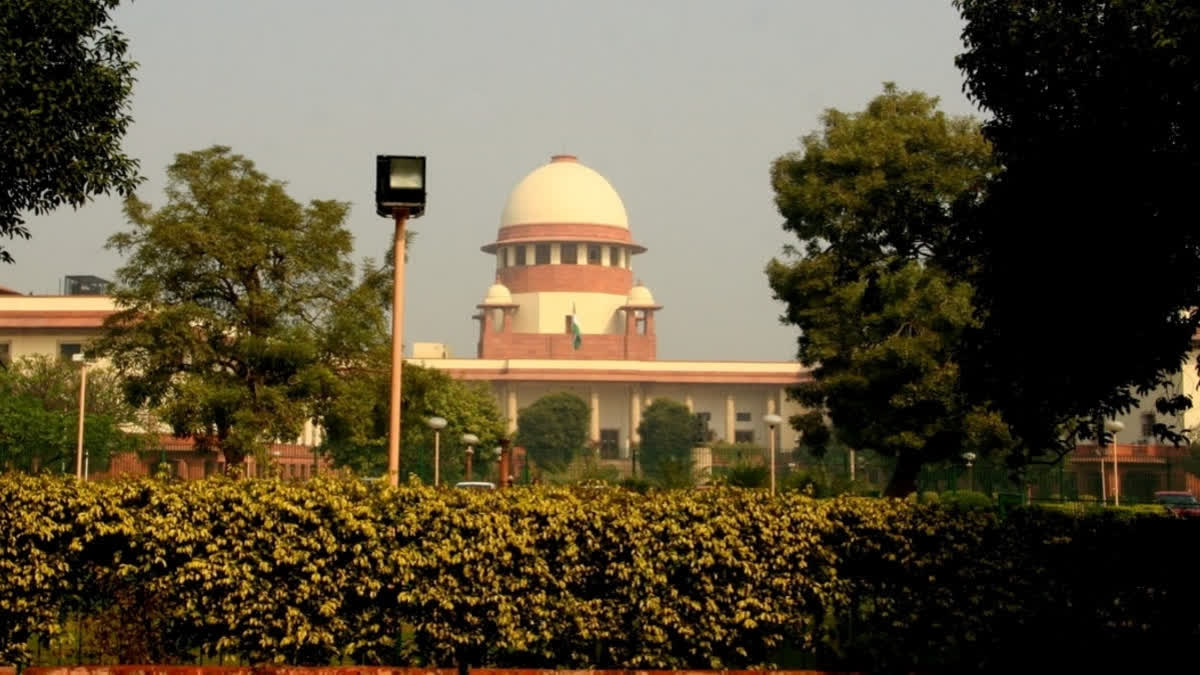New Delhi: In a significant judgment, the Supreme Court on Tuesday said if the purpose of conversion is largely to derive the benefits of reservation but not with any actual belief on the other religion, it cannot be permitted and stressed that the extension of benefits of reservation to people with such ulterior motive will only defeat the social ethos of the policy of reservation.
A bench comprising Justices Pankaj Mithal and R. Mahadevan said: "The conferment of Scheduled caste communal status to the appellant, who is a Christian by religion, but claims to be still embracing Hinduism only for the purpose of availing reservation in employment, would go against the very object of reservation and would amount to fraud on the Constitution".
Justice Mahadevan, who authored the judgment on behalf of the bench, said India is a secular country and every citizen has a right to practise and profess a religion of their choice as guaranteed under Article 25 of the Constitution.
He said one converts to a different religion when he/she is genuinely inspired by its principles, tenets and spiritual thoughts. “However, if the purpose of conversion is largely to derive the benefits of reservation but not with any actual belief on the other religion, the same cannot be permitted, as the extension of benefits of reservation to people with such ulterior motive will only defeat the social ethos of the policy of reservation," said Justice Mahadevan.
The bench said, in the instant case, the evidence presented clearly demonstrates that the appellant professes Christianity and actively practices the faith by attending church regularly.
"Despite the same, she claims to be a Hindu and seeks for Scheduled Caste community certificate for the purpose of employment. Such a dual claim made by her is untenable and she cannot continue to identify herself as a Hindu after baptism," said Justice Mahadevan.
The apex court junked a plea by C Selvarani challenging an order passed by the Madras High Court on January 24, 2023, which dismissed her petition. The petition moved the apex court seeking a direction to the district authorities to issue her Scheduled Caste community certificate. The petitioner, in the present case, claimed reconversion to Hinduism but it was disputed.
The bench said, in the present case, the appellant was a born Christian and could not be associated with any caste and added, in any case, upon conversion to Christianity, one loses her caste and cannot be identified by it.
"As the factum of reconversion is disputed, there must be more than a mere claim. The conversion had not happened by any ceremony or through Arya Samaj. No public declaration was effected. There is nothing on record to show that she or her family has reconverted to Hinduism and on the contrary, there is a factual finding that the appellant still professes Christianity," said the bench.
The petitioner in 2015, had applied for the post of Upper Division Clerk and after a written examination, she was selected and her name was found at serial no 48 under the Scheduled Caste category. The bench noted that in the course of certificate verification, though the appellant possessed the required certificates, the respondent authorities insisted her to produce the original latest community, residence and nativity certificates issued by the Tahsildar, within a period of one year from the date of publication of results, which would satisfy the requirement of being a resident in Puducherry for a continuous period of 5 years prior to the date of application. Pursuant thereto, the appellant made an application seeking community certificate as if she belongs to a Scheduled Caste category.
The Tahsildar passed an order dated March 29, 2016, rejecting the appellant's application on the ground that she does not profess Hinduism, Buddhism and Sikhism and therefore, the community certificate under the S.C. Order, 1964, could not be issued to her.
"The appeal preferred against the said order came to be rejected by the respondent No.2 (The Deputy Collector, Revenue, North), by order dated July 18, 2016. The appellant went on further appeal, in which, the respondent No.1 (special secretary) directed her to approach the High Court for further remedy, by order dated September 30, 2016," noted the bench.
The petitioner claimed she was born on November 22, 1990 to one Christian S/o Mounien and Santhamarie and her birth was duly registered with Pondicherry Municipality and her parents were permanent residents of Kombakkampet, Pondicherry. The petitioner claimed her father, grandparents and great-grandparents professed the Hindu religion and belonged to Valluvan Caste, which is recognised as one of the Scheduled Castes under the SC Order, 1964. Her mother Santhamarie was a Christian by birth and after marriage, she converted to the Hindu religion and started to profess the same.
According to the appellant, she is a Hindu by religion and belongs to Valluvan Caste; and she successfully completed her school education and graduation by availing concessions under the Hindu Adi Dravida quota.
"The field verification clearly revealed the registration of the marriage of the parents of the appellant under the Indian Christian Marriage Act, 1872, the baptism of the appellant and her brother and also the fact that they had been regularly attending the church. Any interference with such findings of fact is unwarranted unless the findings are perverse so as to shock the conscience of the Court," said Justice Mahadevan, while dismissing the appeal.



